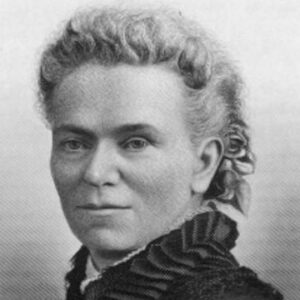Matilda Joslyn Gage was a prominent nineteenth-century women’s rights activist and women’s suffrage leader. She used her pen as a weapon to fight against the subjugation of women, penning numerous speeches, feminist essays, and books that emphasized the significance of women throughout history and how males strategically ignored their role. Matilda Joslyn Gage, who was “born with a hatred for oppression,” was concerned not only with the exploitation of European women, but also with the violence perpetrated against African slaves, native African-American women, and other minor classes in America. Once, she was elected as the National Woman Suffrage Association’s leader. Gage was contemporaries with women’s rights advocates such as Susan B. Anthony and Elizabeth Cady Stanton. When she founded a radical suffrage organization on her own, Anthony and Stanton removed her references from their renowned book on the history of the women’s suffrage movement. Margaret W. Rossiter, a scientific historian, coined the term “Matilda Effect” after Gage’s name.
Youth and Early Life
Matilda Gage was born on March 24, 1826, at the station of the Underground Railroad in Cicero, New York.
Her parents, Hezekiah and Helen Leslie Joslyn were both liberal social reform advocates and free-thinkers.
Gage was instructed at home by her father. She acquired expertise in Greek, Physiology, and Mathematics. She matriculated at the Clinton New York Liberal Institute as she grew older.
Matilda Gage’s Career
Gage’s participation in the women’s rights movement began in 1852 when she delivered a speech at the Third National Women’s Rights Convention in Syracuse at the age of 26. The speech emphasized how slavery and restricted women’s rights were two aspects of the same coin. This speech gained popularity and was subsequently published.
Matilda Joslyn Gage joined the advisory council of the National Woman Suffrage Association in 1869. She served as the organization’s president from 1875 to 1876. In 1875, she appeared before the U.S. Congress to testify under oath in favor of a pending Suffrage Bill. However, when the government failed to approve the Bill, she penned an essay that was distributed at the 1876 NWSA convention in Washington.
The essay angered government officials, who attempted to cancel the convention. However, Gage was successful in foiling their plan. In 1878, she began publishing ‘The National Citizen and the Ballot Box’, a monthly journal of a Toldedo (Ohio) suffrage organization. The publication addressed issues such as the plight of female prisoners and prostitutes and opposition to Class Legislation.
As a result of her persistent advocacy for women’s voting rights, the state of New York granted women the right to elect school board members. She demonstrated moral and legal arguments in support of women who voted in the 1872 Presidential election, including Victoria Woodhull, Ulysses S. Grant, and Susan B. Anthony.
In 1890, Matilda Joslyn Gage founded a radical organization called Woman’s National Liberal UNION (WNLU). As a reaction to the conservative takeover of the suffrage movement, this group was founded. WNLU quickly became a forum for radical ideas, such as prison reform and the formation of labor unions. WNLU’s journal ‘The Liberal Thinker’ was edited by Gage.
Anthony and Elizabeth Stanton were not in favor of the creation of WNLU. They spoke out against Gage in public and removed any mention of her from the fourth volume of “The History of Woman Suffrage.” Gage was a staunch supporter of church-state separation because he believed that church doctrines actively promoted the patriarchal system.
She authored numerous pamphlets, essays, and books on women’s autonomy over their lives and bodies.
In accordance with the Fugitive Slave Act of 1850, she was imprisoned for assisting runaway slaves.
Matilda’s Major Opera
During her lifetime, Matilda Gage published a vast assortment of opinion pieces, essays, and books. Her most notable works include “Woman as Inventor” (1870), “History of Woman Suffrage” (1881), “Woman, Church and State” (1893), “Prospectus,” and “Indian Citizenship.”
Personal History and Legacy
The marriage between Matilda and Henry Hill Gage produced five children: Charles Henry, Helen Leslie, Thomas Clarkson, Julia Louise, and Maud. Maud wed L. Frank Baum, the author of the classic children’s story “The Wonderful Wizard of Oz.” Dorothy Gale’s parents, Thomas Clarkson Gage and his wife Sophia, were the namesake of the fictional character established by her uncle Baum.
Gage passed away at the Baum residence in Chicago in 1898. There is a memorial stone erected in her honor at Fayetteville Cemetery bearing the inscription, “There is a word sweeter than Mother, Home, or Heaven. That word is Freedom.”
Estimated Net Worth
Matilda Joslyn Gage has a net worth of $5 million and was “born with a hatred for oppression.”
Trivia
She was inspired by the matriarchal Iroquois society. She spent time with them and was accepted into the Iroquois Council of Matrons, which gave her the name “Karonienhawi” – “she who holds the sky.”
Margaret W. Rossiter, a scientific historian, devised the term “Matilda Effect” as an antithesis to the “Matthew Effect” in 1993, in honor of Matilda Joslyn Gage. It was intended to acknowledge a social situation in which a woman scientist would unfailingly receive less credit for her contribution to science due to gender discrimination.
Gage was appalled when her daughter, Maud, informed her of her decision to marry Baum, a struggling actor at the time. A few minutes later, however, she blurted out laughing, knowing that her daughter shared the same obstinate characteristics as she did.


